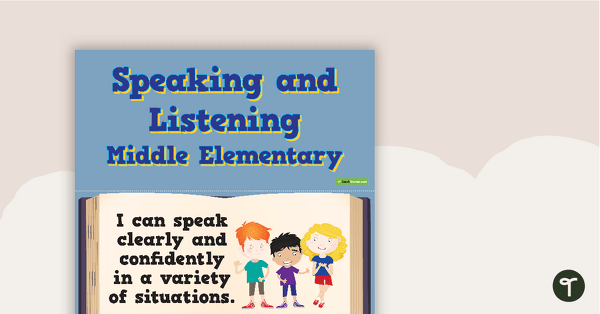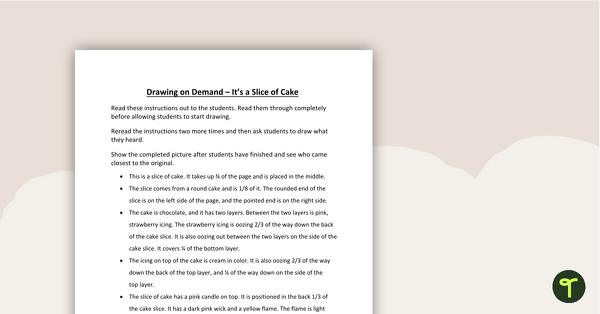Teks
ELAR 2.1
Developing and sustaining foundational language skills: listening, speaking, discussion, and thinking--oral language. The student develops oral language through listening, speaking, and discussion. The student is expected to:
- (1) Author's purpose and craft: listening, speaking, reading, writing, and thinking using multiple texts. The student uses critical inquiry to analyze the authors' choices and how they influence and communicate meaning within a variety of texts. The student analyzes and applies author's craft purposefully in order to develop his or her own products and performances. The student is expected to:
- (2) discuss the author's purpose for writing text;
- (A) discuss how the use of text structure contributes to the author's purpose;
- (B) discuss the author's use of print and graphic features to achieve specific purposes;
- (C) discuss the use of descriptive, literal, and figurative language;
- (D) identify the use of first or third person in a text; and
- (E) identify and explain the use of repetition.
- (F) Composition: listening, speaking, reading, writing, and thinking using multiple texts--writing process. The student uses the writing process recursively to compose multiple texts that are legible and uses appropriate conventions. The student is expected to:
- (3) plan a first draft by generating ideas for writing
such as drawing and brainstorming;
- (A) develop drafts into a focused piece of writing by:
- (B) organizing with structure; and
- (i) developing an idea with specific and relevant details;
- (ii) revise drafts by adding, deleting, or rearranging words, phrases, or sentences;
- (C) edit drafts using standard English conventions, including:
- (D) complete sentences with subject-verb agreement;
- (i) past, present, and future verb tense;
- (ii) singular, plural, common, and proper nouns;
- (iii) adjectives, including articles;
- (iv) capitalization of months, days of the week, and the salutation and conclusion of a letter;
- (v) adverbs that convey time and adverbs that convey place;
- (vi) prepositions and prepositional phrases;
- (vii) pronouns, including subjective, objective, and possessive cases;
- (viii) coordinating conjunctions to form compound subjects and predicates;
- (ix) end punctuation, apostrophes in contractions, and commas with items in a series and in dates; and
- (x) correct spelling of words with grade-appropriate orthographic patterns and rules and high-frequency words; and
- (xi) publish and share writing.
- (E) Composition: listening, speaking, reading, writing, and thinking using multiple texts--genres. The student uses genre characteristics and craft to compose multiple texts that are meaningful. The student is expected to:
- (4) compose literary texts, including personal
narratives and poetry;
- (A) compose informational texts, including procedural texts and reports; and
- (B) compose correspondence such as thank you notes or letters.
- (C) Inquiry and research: listening, speaking, reading, writing, and thinking using multiple texts. The student engages in both short-term and sustained recursive inquiry processes for a variety of purposes. The student is expected to:
- (5) generate questions for formal and informal inquiry
with adult assistance;
- (A) develop and follow a research plan with adult assistance;
- (B) identify and gather relevant sources and information to answer the questions;
- (C) identify primary and secondary sources;
- (D) demonstrate understanding of information gathered;
- (E) cite sources appropriately; and
- (F) use an appropriate mode of delivery, whether written, oral, or multimodal, to present results.
- (G) listen actively, ask relevant questions to clarify information, and answer questions using multi-word responses;
- (H) follow, restate, and give oral instructions that involve a short, related sequence of actions;
- (I) share information and ideas that focus on the topic under discussion, speaking clearly at an appropriate pace and using the conventions of language;
- (J) work collaboratively with others by following agreed-upon rules for discussion, including listening to others, speaking when recognized, making appropriate contributions, and building on the ideas of others; and
- (K) develop social communication such as distinguishing between asking and telling.
Show more
33 - 64 of 34 teaching resources for those 'aha' moments
- Plus Plan

'I Can' Statements - Speaking and Listening (Middle Elementary)
A set of 13 'I can' statement cards focusing on speaking and listening for middle elementary.
- Plus Plan

Directed Drawing - How to Draw a Piece of Cake
Use this directed drawing activity of a piece of cake to help students develop their listening skills in the classroom.